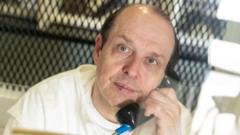### Summary: Robert Roberson, sentenced to death for the alleged murder of his daughter in a shaken baby syndrome case, received a reprieve from execution just hours before it was scheduled, leading to calls for reassessment of his conviction based on outdated scientific evidence.
### Title: Texas Judge Halts Execution of Man Wrongfully Convicted in Shaken Baby Syndrome Case

### Title: Texas Judge Halts Execution of Man Wrongfully Convicted in Shaken Baby Syndrome Case
### Description: A last-minute ruling prevents the execution of Robert Roberson, sparking nationwide discussions on the validity of shaken baby syndrome convictions.
A Texas judge has interrupted the impending execution of Robert Roberson, the first man in the United States to face death for murder linked to "shaken baby syndrome." Roberson's scheduled execution was just two hours away when a Travis County judge issued a temporary restraining order to delay it. This decision came after lawmakers in Texas sought to have Roberson testify regarding his case at an upcoming legislative hearing on October 21.
Roberson was sentenced to death in 2003 following the tragic death of his two-year-old daughter, Nikki Curtis. Prosecutors believed Nikki's passing resulted from inflicted injuries, but Roberson and his defenders have argued that she succumbed to pneumonia-related complications. Despite persistent claims of his innocence, the prosecution maintains that new evidence fails to overturn the initial verdict.
As execution time approached, a surprise subpoena from a Texas House panel aimed to bring Roberson before them, prompting swift legal action to stall his execution. Notably, an appeals court on this matter and further challenges have emerged, including a failed clemency petition from the Texas Board of Pardons and Paroles earlier in the week.
In a compelling display of bipartisan support for Roberson, 86 lawmakers, alongside medical professionals and advocates, have pressed for clemency, citing that the original conviction heavily relied on outdated medical interpretations of "shaken baby syndrome." Among them was renowned author John Grisham, pointing out the moral implications of executing someone whose case was deeply flawed from the outset.
Roberson's defense raised critical questions regarding his autism—previously undiagnosed—that influenced perceptions of his emotional responses during the investigation. This aspect has sparked discussions about the intersection of mental health and justice, particularly in high-stakes cases like Roberson’s.
With a temporary respite secured, focus now shifts to the Texas Governor Greg Abbott, who has the authority to intervene further, having granted only one reprieve in his nearly ten years in office. As public scrutiny intensifies over the severity and reliability of shaken baby syndrome allegations, the case poses significant ethical concerns for the future of capital punishment in the U.S.




















